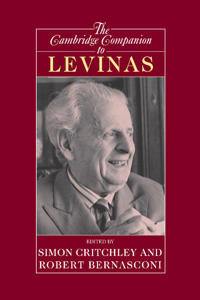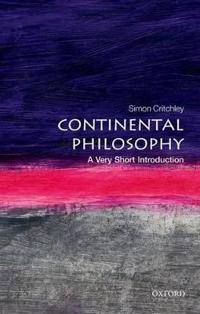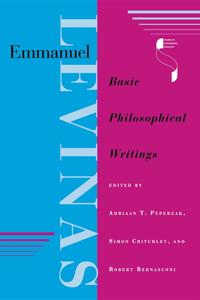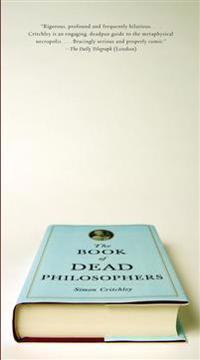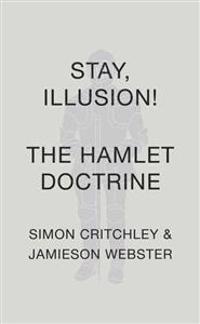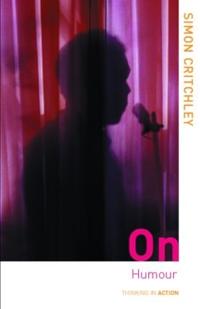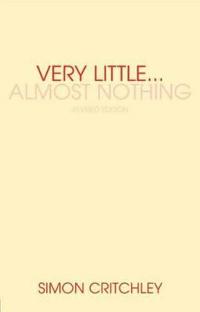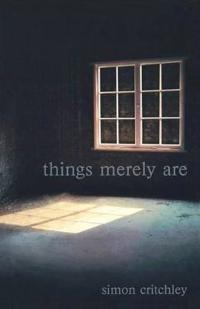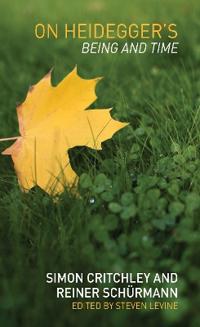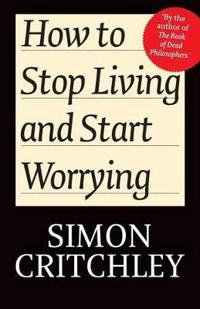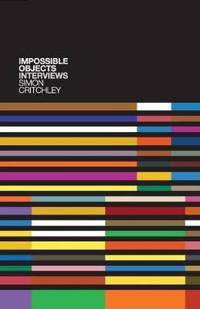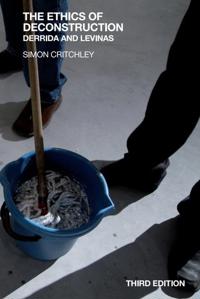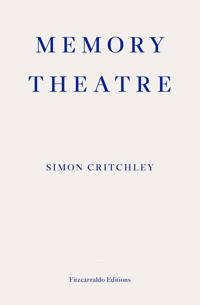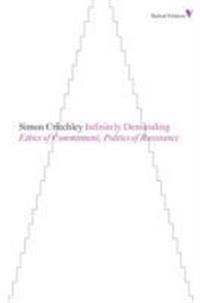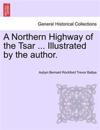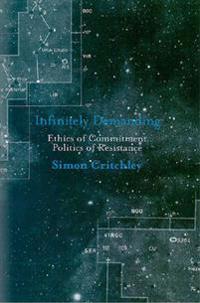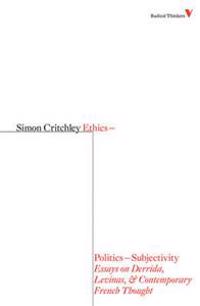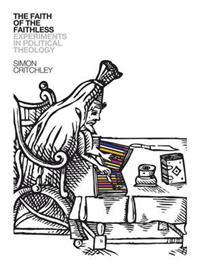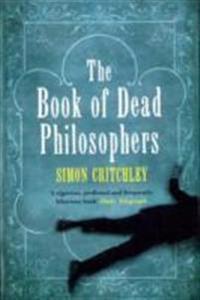The Cambridge Companion to Levinas (Pocket)
avSimon Critchley, Robert Bernasconi, Simon Critchley
ISBN: 9780521665650 - UTGIVEN: 200209Emmanuel Levinas is now widely recognised alongside Heidegger, Merleau-Ponty and Sartre as one of the most important Continental philosophers of the twentieth century. His abiding concern was the primacy of the ethical relation to the other person and his central thesis was that ethics is first phil[...]
Continental Philosophy (Häftad)
avSimon Critchley
ISBN: 9780192853592 - UTGIVEN: 200102Simon Critchley's Very Short Introduction shows that Continental philosophy encompasses a distinct set of philosophical traditions and practices, with a compelling range of problems all too often ignored by the analytic tradition. He discusses the ideas and approaches of philosophers such as Kant, [...]
Emmanuel Levinas (Häftad)
avAdriaan Theodoor Peperzak, Simon Critchley, Robert Bernasconi
ISBN: 9780253210791 - UTGIVEN: 1996-06Emmanuel Levinas (1906D1996) has exerted a profound influence on 20th-century continental philosophy. This anthology, including Levinas's key philosophical texts over a period of more than forty years, provides an ideal introduction to his thought and offers insights into his most innovative ideas. [...]
Stay, Illusion!: The Hamlet Doctrine (Inbunden)
avSimon Critchley, Jamieson Webster
ISBN: 9780307907615 - UTGIVEN: 201306The figure of Hamlet haunts our culture like the ghost haunts Shakespeare's melancholy Dane. Arguably, no literary work is more familiar to us. Everyone knows at least six words from "Hamlet, " and most people know many more. Yet the play--Shakespeare's longest--is more than "passing strange," and i[...]
Stay, Illusion! (Pocket)
avSimon Critchley, Jamieson Webster
ISBN: 9780307950482 - UTGIVEN: 2014-04-22Deconstruction and Pragmatism (Häftad)
avSimon Critchley, Jacques Derrida, Ernesto Laclau
ISBN: 9780415121705 - UTGIVEN: 1996-09Deconstruction and pragmatism constitute two of the major intellectual influences on the contemporary theoretical scene; influences personified in the work of Jacques Derrida and Richard Rorty. Both Rortian pragmatism, which draws the consequences of post-war developments in Anglo-American philosoph[...]
On Humour (Häftad)
avSimon Critchley
ISBN: 9780415251211 - UTGIVEN: 200205Does humour make us human, or do the cats and dogs laugh along with us? On Humour is a fascinating, beautifully written and funny book on what humour can tell us about being human. Simon Critchley skilfully probes some of the most perennial but least understood aspects of humour, such as our tendenc[...]
Humor (Pocket)
avSimon Critchley
ISBN: 9780415306560 - UTGIVEN: 2002-11-21Humor is een fascinerend, prachtig geschreven en komisch boek over wat homor ons kan vertellen over onze menselijke natuur.
Van de oudheid tot aan de moderne tijd en puttend uit het werk van een breed scala aan auteurs, in het bijzonder Swift, Sterne, Shaftesbury, Bergson, Beckett en Freud, keer[...]Very Little, Almost Nothing (Häftad)
avSimon Critchley
ISBN: 9780415340496 - UTGIVEN: 200405Very Little ...Almost Nothing puts the question of the meaning of life back at the centre of intellectual debate. Its central concern is how we can find a meaning to human finitude without recourse to anything that transcends that finitude. A profound but secular meditation on the theme of death, Cr[...]
Things Merely are (Storpocket)
avSimon Critchley
ISBN: 9780415356312 - UTGIVEN: 200502This book is an invitation to read poetry. Simon Critchley argues that poetry enlarges life with a range of observation, power of expression and attention to language that eclipses any other medium. In a rich engagement with the poetry of Wallace Stevens, Critchley reveals that poetry also contains [...]
On Heidegger's "Being and Time" (Storpocket)
avReiner Schurmann, Simon Critchley
ISBN: 9780415775960 - UTGIVEN: 200806On Heidegger's Being and Time is an outstanding exploration of Heidegger's most important work by two major philosophers. Simon Critchley argues that we must see Being and Time as a radicalization of Husserl's phenomenology, particularly his theories of intentionality, categorial intuition, and the [...]
How to Stop Living and Start Worrying: Conversations with Carl Cederstr m (Inbunden)
avSimon Critchley, Carl Cederstrom
ISBN: 9780745650388 - UTGIVEN: 2010-09-30How to Stop Living and Start Worrying: Conversations with Carl Cederstrom (Häftad)
avSimon Critchley
ISBN: 9780745650395 - UTGIVEN: 201010The question of how to lead a happy and meaningful life has been at the heart of philosophical debate since time immemorial. Today, however, these questions seem to be addressed not by philosophers but self-help gurus, who frantically champion the individual's quest for self-expression and self-real[...]
Impossible Objects (Häftad)
avSimon Critchley, Carl Cederstrom
ISBN: 9780745653204 - UTGIVEN: 2011-11-30Impossible Objects: Interviews (Häftad)
avSimon Critchley, Carl Cederstrom, Todd Kesselman
ISBN: 9780745653211 - UTGIVEN: 201112Impossible objects are those about which the philosopher, narrowly conceived, can hardly speak: poetry, film, music, humor. Such "objects" do not rely on philosophy for interpretation and understanding; they are already independent practices and sites of sensuous meaning production. As Elvis Costell[...]
The Ethics of Deconstruction (Häftad)
avSimon Critchley
ISBN: 9780748689323 - UTGIVEN: 2014-03This is an expanded edition of the first book to argue for the ethical turn in Derrida's work. Simon Critchley's first book, The Ethics of Deconstruction, was originally published to great acclaim in 1992. It was the first book to argue for the ethical turn in Derrida's work and to show as powerfull[...]
Memory Theatre (Häftad)
avSimon Critchley
ISBN: 9780992974718 - UTGIVEN: 2014-09A French philosopher dies during a savage summer heat wave. Boxes carrying his unpublished miscellany mysteriously appear in Simon Critchley's office. Rooting through piles of papers, Critchley discovers a brilliant text on the ancient art of memory and a cache of astrological charts predicting the [...]
Infinitely Demanding (Häftad)
avSimon Critchley
ISBN: 9781781680179 - UTGIVEN: 201301The clearest, boldest and most systematic statement of Simon Critchley's influential views on philosophy, ethics, and politics, Infinitely Demanding identifies a massive political disappointment at the heart of liberal democracy. Arguing that what is called for is an ethics of commitment that can in[...]
The Hamlet Doctrine (Inbunden)
avSimon Critchley, Jamieson Webster
ISBN: 9781781682562 - UTGIVEN: 2013-09What are we to do in our information-saturated age? Do we know too much to be able to act? Have we all become Hamlet in the tragedy of modern life? In this riveting and thought-provoking re-examination of Shakespeare's most famous tragedy, philosopher Simon Critchley and psychoanalyst Jamieson Webs[...]
Infinitely Demanding (Häftad)
avSimon Critchley
ISBN: 9781844672967 - UTGIVEN: 200809"Infinitely Demanding" is the clearest, boldest and most systematic statement of Simon Critchley's influential views on philosophy, ethics and politics. Part diagnosis of the times, part theoretical analysis of the impasses and possibilities of ethics and politics, part manifesto, "Infinitely Demand[...]
Ethics-politics-subjectivity (Häftad)
avSimon Critchley
ISBN: 9781844673513 - UTGIVEN: 200905In Ethics - Politics - Subjectivity, Simon Critchley takes up three questions at the centre of contemporary theoretical debate: What is ethical experience? What can be said of the subject who has this experience? What, if any, is the relation of ethical experience to politics? Through spirited confr[...]
The Faith of the Faithless (Inbunden)
avSimon Critchley
ISBN: 9781844677375 - UTGIVEN: 201202The return to religion has perhaps become the dominant cliche of contemporary theory, which rarely offers anything more than an exaggerated eco of a political reality dominated by religious war. Somehow, the secular age seems to have been replaced by a new era, where political action flows directly [...]
Book of Dead Philosophers (Häftad)
avSimon Critchley
ISBN: 9781847080790 - UTGIVEN: 200910The question of what constitutes a 'good death' has been the central preoccupation of philosophers since ancient times. This book includes 190 philosopher's deaths that are bizarre, and tales of madness, murder, and pathos.[...]

